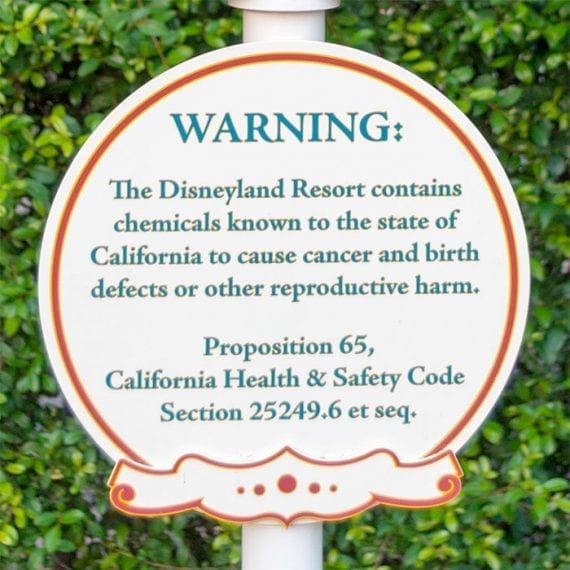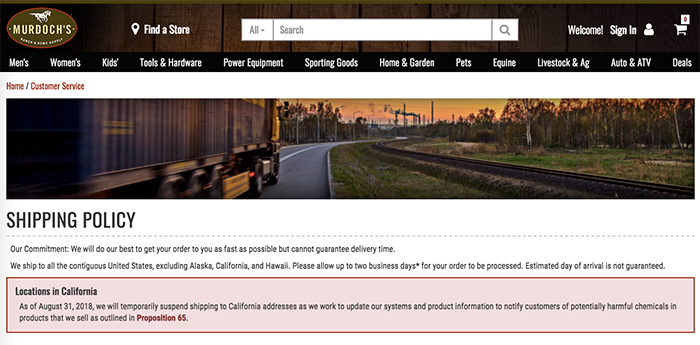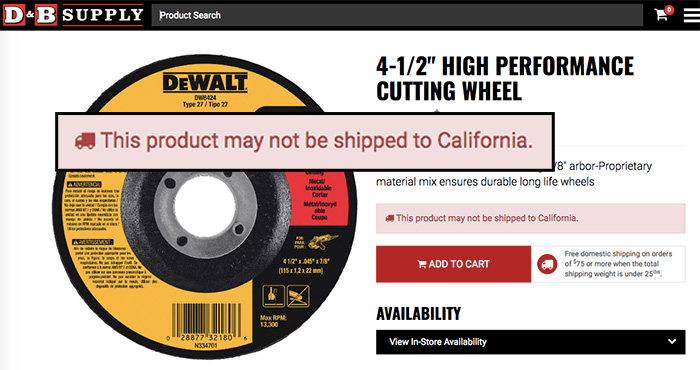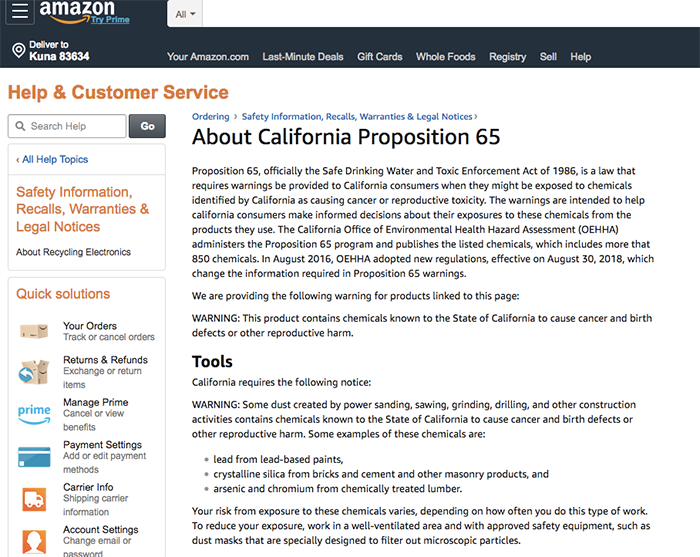California cancer and birth-defect warning requirements that took effect in August 2018 have stopped at least some online merchants from selling products to state residents.
Although the new requirements place primary responsibility for providing warnings on product manufacturers, retail businesses (including ecommerce retailers without physical locations in California) cannot knowingly sell products to California residents that expose them to chemicals that could cause cancer, birth defects, or other reproductive harm — without providing clear and reasonable warnings.
California Prop 65
Approved in 1986, California Proposition 65 requires the state to publish a list of chemicals known to cause cancer or to interfere with human reproduction. The law does not prohibit the sale or use of listed chemicals; rather, it addresses concerns about exposure.
Under Prop 65, businesses with more than 10 employees that knowingly and intentionally expose California consumers to meaningful levels of specific chemicals must warn those consumers. Failure to provide clear and reasonable warnings can result in as much as $2,500 per day in penalties, as well as civil lawsuits.
In fact, since Prop 65 took effect, some businesses, including companies based outside of California, have complained the law exposes them to frivolous civil actions and undue compliance costs.
As an example, the Center for Accountability in Science, a controversial non-profit group, has published several articles, reports, and videos attacking California Prop 65.
“Between 2010 and 2017, businesses lost a total of $182.1 million settling Proposition 65 lawsuits — a figure that does not include the amount paid from cases that actually went to trial,” the Center for Accountability in Science reported.
The fear of lawsuits led some product makers and businesses to put a generic Prop 65 warning label on just about everything.
Over-warnings
Back in 1986, more than two-thirds of California voters approved Prop 65. Even today, you would be hard pressed to find consumers anywhere who would not want to know that a particular product exposes them to potential harm. But in California, over-warning became a serious problem.
Rather than determining if a product contained a chemical on the Prop 65 list or deciding if the risk of exposure merited a warning, product manufacturers and other businesses simply placed a generic notice on just about everything.
WARNING: This product contains chemicals known to the State of California to cause cancer and birth defects or other reproductive harm.
When every product, restaurant, amusement park, and retail store contained a cancer and birth-defect warning, no real information is being provided to consumers. So the organization responsible for administering Prop 65 made a change.

Even Disneyland posted a generic Proposition 65 warning. The purpose of the warning was presumably to limit exposure to lawsuits, but it did not provide any real or actionable information.
Beginning August 31, 2018, Prop 65 warnings must (a) name of at least one listed chemical that prompted the warning, (b) include the URL www.P65Warnings.ca.gov, which is a source for additional information, and (c) feature a yellow, triangular warning symbol. Here is a warning of arsenic, for example.
WARNING: This product can expose you to chemicals including arsenic, which is known to the State of California to cause cancer. For more information, go to www.P65Warnings.ca.gov.
The hope is that the simple act of naming even a single listed chemical would require companies to compare their products to the Prop 65 chemical list and therefore provide more meaningful warnings.
Retailer Responsibilities
The new Prop 65 warning requirements also clarify the relationship between manufacturers and retailers. While manufacturers have the primary responsibility of providing warning labels or at least notifying retailers of the potential for exposure to listed chemicals, ecommerce businesses must warn shoppers before a purchase is made.
California Proposition 65 (PDF) Section 25602(b) requires online sellers to provide a warning (or a hyperlink to such a warning) for any item that would expose a California resident to a listed chemical at a concentration above a safe harbor level.
This requirement has caused some online sellers to at least temporarily stop shipping products to California residents. For example, Murdoch’s Ranch and Home Supply posted this notice on its shipping policy page:
Locations in California. As of August 31, 2018, we will temporarily suspend shipping to California addresses as we work to update our systems and product information to notify customers of potentially harmful chemicals in products that we sell as outlined in Proposition 65.

Some online and multichannel retailers are simply not shipping items to California. Murdoch’s, the farm and ranch retailer, posted this notice, temporarily suspending product shipments to California addresses.
For an ecommerce business, the challenge may be capturing the right warning message for each product. This could require an online merchant to store Prop 65 information as product attributes in the company’s database.

It can be a challenge to know which products require a Prop 65 notice. The retailer of this cutting wheel is unsure, stating “it may not be shipped to California.”
As an example, each product record in an ecommerce database could store a field identifying whether or not a product required a Prop 65 warning. The manufacturer would provide this information.
If a warning was required, the product database could also identify at least one listed chemical and specify whether the warning is related to cancer, birth defects, or both.
Using this approach, a web developer could set up the site to display the proper warning on a given product detail page, in the shopping cart, and during the checkout process, thus limiting an online retailer’s exposure to lawsuits and penalties.
A second approach would be to place all Prop 65 warnings on a single page and link to that page from each affected product.
At the time of writing, Amazon had adopted this approach. Products that could expose a California resident to a listed chemical include a warning notification link on the Amazon product detail page. The link leads to a larger warning page describing the potential exposure of various classes of products.

Amazon has consolidated Prop 65 warnings on a single page.
It may also be that some products simply cannot be sold to customers in California. Rather than taking the time and expense to comply with Proposition 65, some manufacturers sent notifications to retailers stating that their products may not be sold in California or to its residents. In these cases, it probably makes sense to look for different suppliers or simply state that the manufacturer does not allow California sales.
Regardless of what one thinks about California Proposition 65, ecommerce businesses that sell to California residents now must provide clear and reasonable warnings on certain products before shoppers make a purchase.




